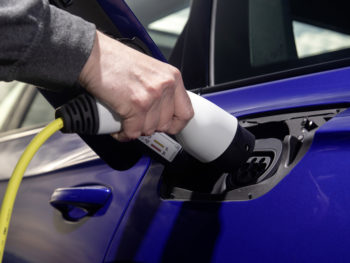Electric and hybrid car registrations trump diesels in June
Ultra-low emission vehicles saw more new car registrations than diesels in June, giving credence to ongoing reports that ULEVs hold the key to new car market recovery.

Ultra-low emission vehicles accounted for more new cars than diesels in June
Latest figures from the Society of Motor Manufacturers and Traders (SMMT) show 147,377 new cars were registered in June – a year-on-year decline of 34.9% but more positive than the 89.0% ‘wipe-out’ seen in May.
While petrol and diesel both saw substantial declines – down 39.9% and 59.8% respectively – take-up of ultra-low emission vehicles was actually up year-on year.
Battery-electric vehicles more than tripled, from 2,461 units registered in June 2019 to 8,903 last month. Registrations of plug-in hybrids rose 117%, from 2,270 units to 4,926. And full hybrids were up 19.3%, from 8,583 to 10,239 units. The resultant combined 24,068 registrations actually beat the 23,011 diesel cars registered last month and while it still fell short of the 87,896 petrol cars registered, there is an expectation that petrol may have also hit its peak, following the decline of diesel.
Michael Woodward, UK automotive lead, Deloitte, said: “Given the expected growth of EVs over the next few years, it is entirely possible that no matter how swift the recovery, petrol and diesel sales may not reach their pre-Covid levels again. Should this be the case, it would represent a significant landmark in automotive history that has passed relatively unnoticed.”
The collective market share for the battery-electric, plug-in hybrid and hybrid segments also shows the change in sentiment in the last year, hitting 14.5% – more than double the 5.9% share seen by all three combined in June 2019.
Woodward continued: “The proportion of EV sales, relative to the rest of the market, is a reminder that climate change and sustainability remain firmly on the agenda for today’s consumer. As the price points and performance of EVs edge closer to petrol and diesel equivalents, the environmental benefits of switching to electric will play an increasingly important role in the consumers’ decision-making process.”
Recent research by Venson had already found that the lockdown has had a dramatic positive impact on people’s awareness of the benefits of reduced air pollution – with nearly half (45%) of drivers now considering a switch to electric vehicles in the future.
It’s not just the eco benefits that are at stake though; under the 2020-21 company car tax ratings, Benefit-in-Kind tax liability for fully electric company car drivers fell to 0% on 6 April 2020 and will only rise to 1% for the 2021-22 tax year. And research published prior to the pandemic by DriveElectric found the 0% BiK on EVs could see 80% of opt-out drivers return to company cars.
The RAC has also highlighted the rise in ultra-low emission vehicle registrations in the new SMMT figures, although data insight spokesperson Rod Dennis said we are yet to see how the appetite for new cars among both fleets and private drivers will be affected by the coronavirus and a possible economic downturn.
However, ULEVs are already expected to provide the basis for any forthcoming scrappage scheme, which would reinforce the underlying switch away from petrol and diesels.
Rod Dennis added: “This is something to watch in the coming months as manufacturers begin to introduce new hybrid options for their existing vehicle models. It will be very interesting to see if more drivers opt one of these rather than commit to a vehicle entirely powered by batteries.”
The UK’s fleet and auto industries will also need to play a role in helping drive plug-in vehicle take-up though; research published two months ago by the Go Ultra Low initiative found nearly a third of the UK’s fleet managers (32%) were unaware of the 0% BiK on company cars – which also benefits fleets through Class 1A NICs. And research in May by Regit.cars has said more work must be done to demystify EVs.

